Project Management Knowledge: Sustainability in Project Management
VerifiedAdded on 2022/08/24
|16
|4106
|15
Report
AI Summary
This report delves into the core principles of project management, emphasizing the critical role of sustainability in achieving successful project outcomes. The report outlines the key phases of project management, including initiation, planning, execution, monitoring and control, and closure, highlighting their significance in organizing and delivering projects effectively. It explores the concept of sustainability, defining its economic, social, and environmental dimensions, and examines how integrating sustainability into project management can enhance resource utilization and minimize environmental impact. The report references several studies, including those by Banihashemi et al. (2017), Ebbesen and Hope (2013), Silvius and van den Brink (2014), and Carvalho and Rabechini Jr (2017), to illustrate critical success factors for sustainable construction projects, the importance of re-imagining the project management triangle, and the integration of sustainability into project management practices. The analysis emphasizes the importance of ethical considerations, sustainable planning, and community vision in fostering responsible project development. This report aims to provide a comprehensive understanding of sustainable project management practices.
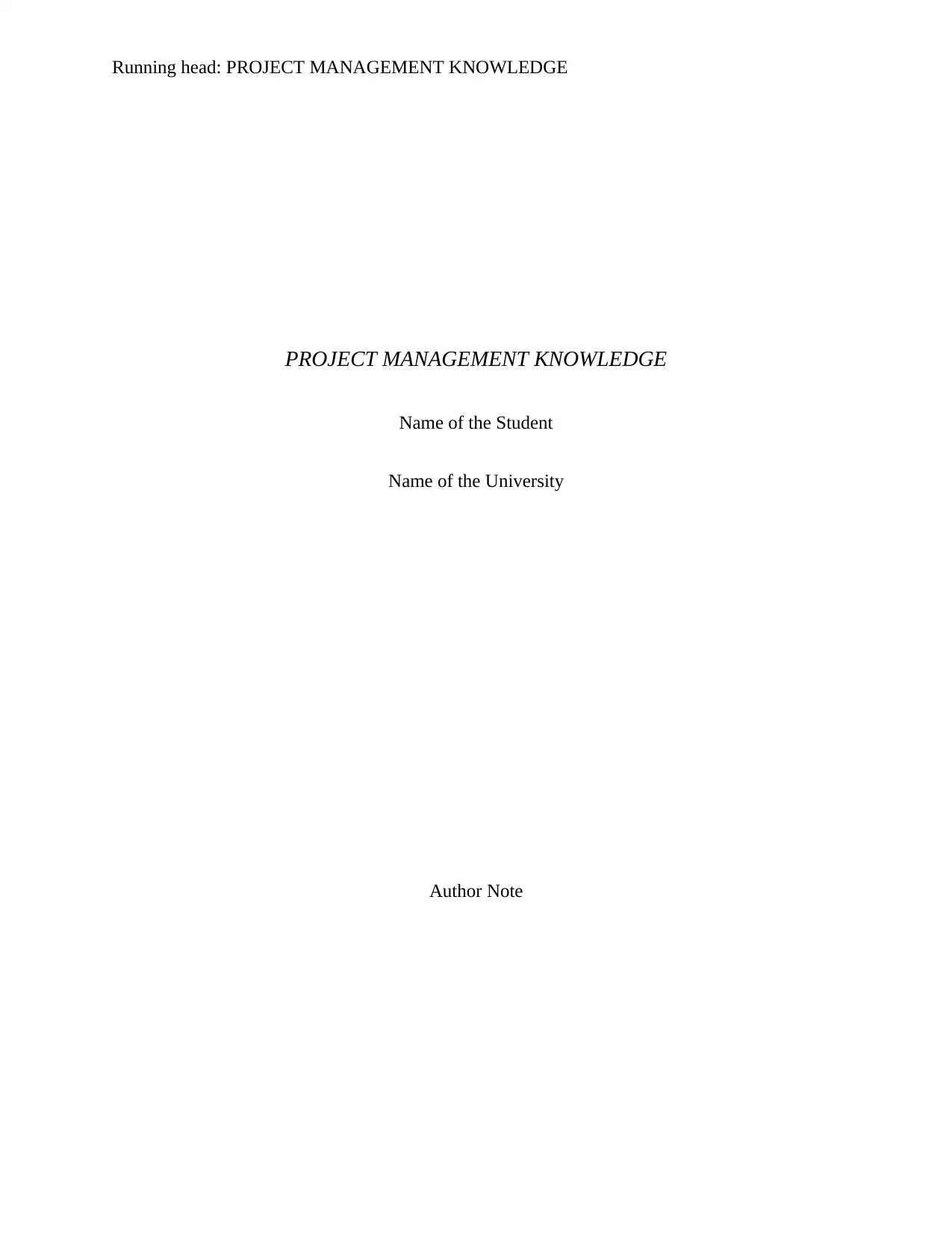
Running head: PROJECT MANAGEMENT KNOWLEDGE
PROJECT MANAGEMENT KNOWLEDGE
Name of the Student
Name of the University
Author Note
PROJECT MANAGEMENT KNOWLEDGE
Name of the Student
Name of the University
Author Note
Paraphrase This Document
Need a fresh take? Get an instant paraphrase of this document with our AI Paraphraser
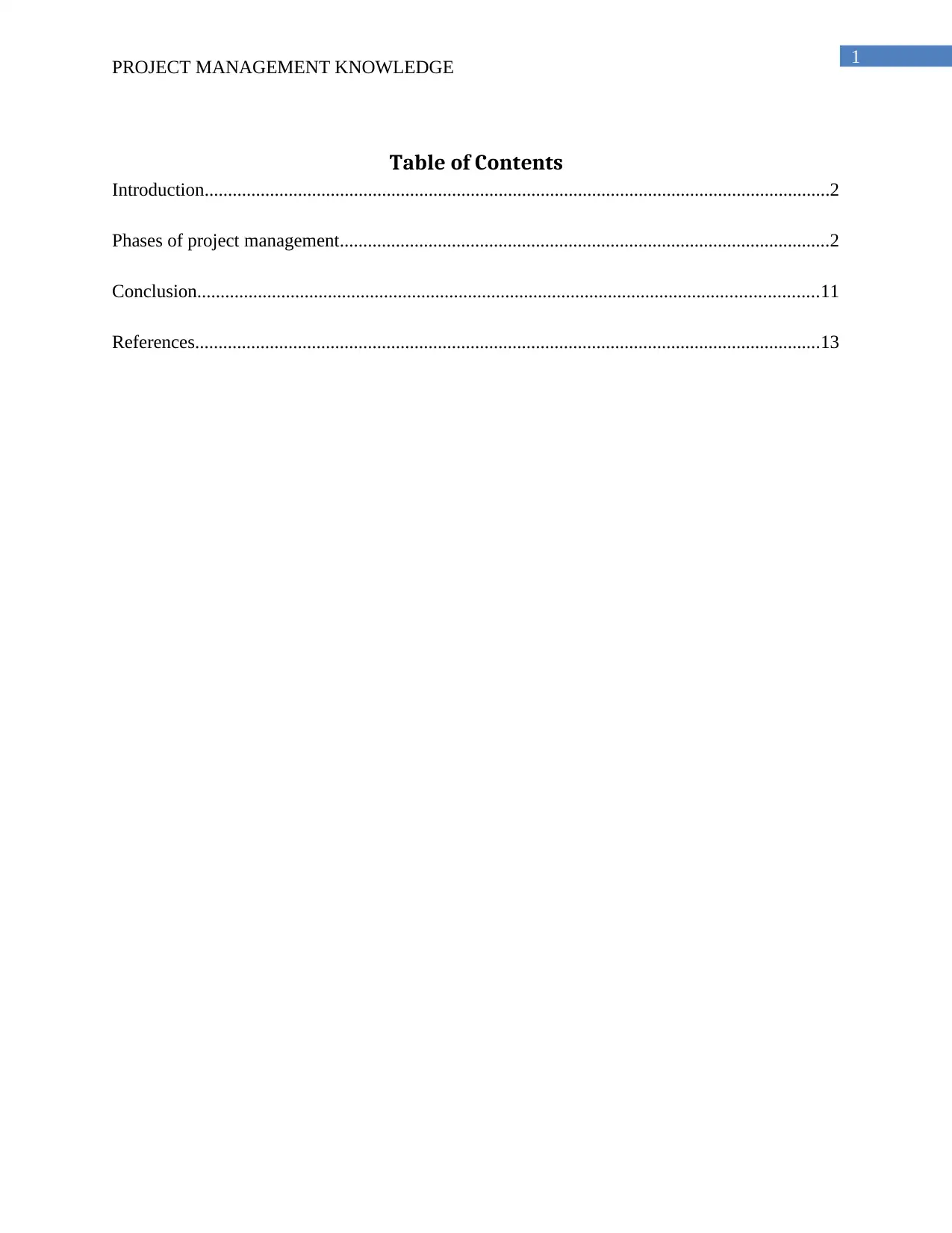
1
PROJECT MANAGEMENT KNOWLEDGE
Table of Contents
Introduction......................................................................................................................................2
Phases of project management.........................................................................................................2
Conclusion.....................................................................................................................................11
References......................................................................................................................................13
PROJECT MANAGEMENT KNOWLEDGE
Table of Contents
Introduction......................................................................................................................................2
Phases of project management.........................................................................................................2
Conclusion.....................................................................................................................................11
References......................................................................................................................................13
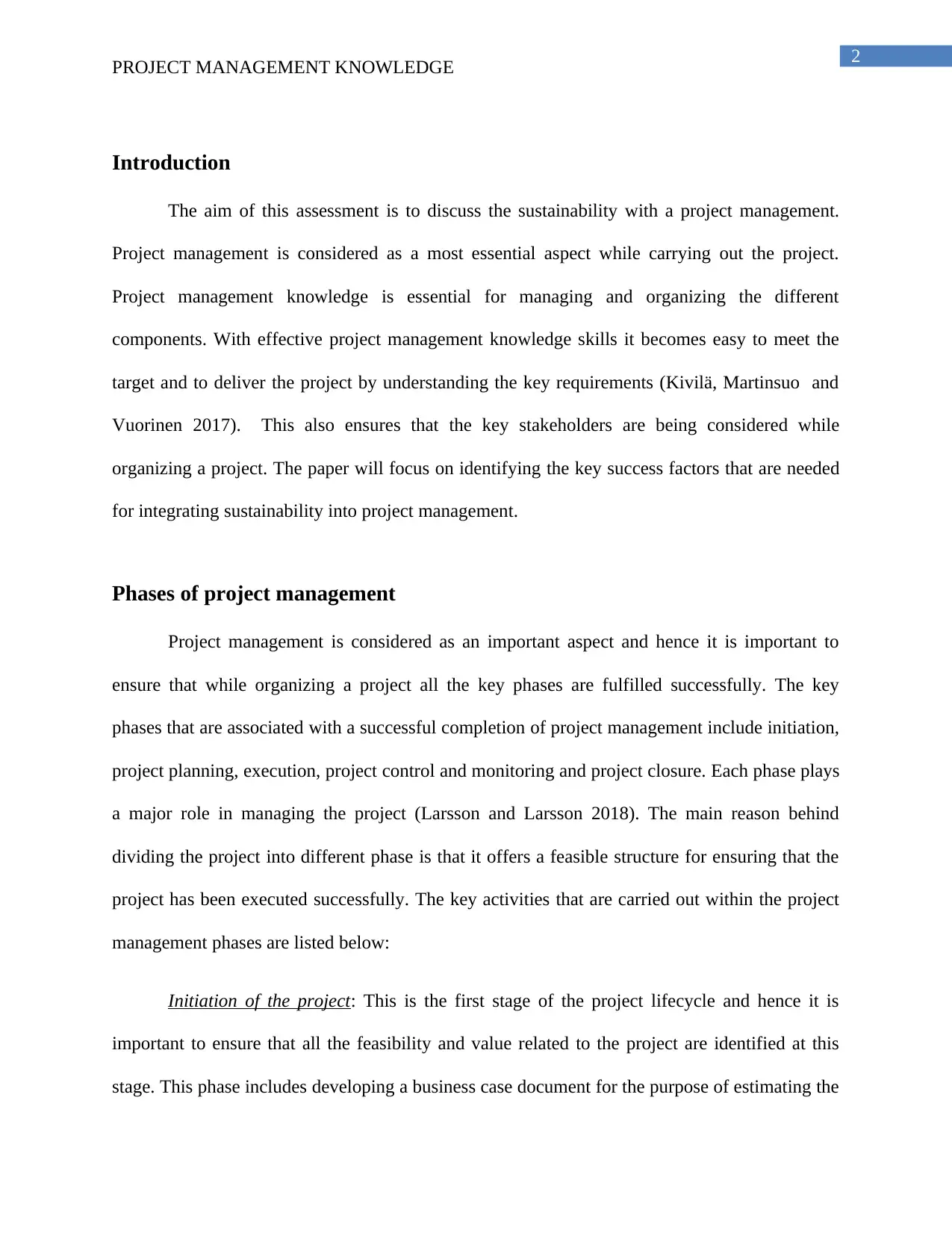
2
PROJECT MANAGEMENT KNOWLEDGE
Introduction
The aim of this assessment is to discuss the sustainability with a project management.
Project management is considered as a most essential aspect while carrying out the project.
Project management knowledge is essential for managing and organizing the different
components. With effective project management knowledge skills it becomes easy to meet the
target and to deliver the project by understanding the key requirements (Kivilä, Martinsuo and
Vuorinen 2017). This also ensures that the key stakeholders are being considered while
organizing a project. The paper will focus on identifying the key success factors that are needed
for integrating sustainability into project management.
Phases of project management
Project management is considered as an important aspect and hence it is important to
ensure that while organizing a project all the key phases are fulfilled successfully. The key
phases that are associated with a successful completion of project management include initiation,
project planning, execution, project control and monitoring and project closure. Each phase plays
a major role in managing the project (Larsson and Larsson 2018). The main reason behind
dividing the project into different phase is that it offers a feasible structure for ensuring that the
project has been executed successfully. The key activities that are carried out within the project
management phases are listed below:
Initiation of the project: This is the first stage of the project lifecycle and hence it is
important to ensure that all the feasibility and value related to the project are identified at this
stage. This phase includes developing a business case document for the purpose of estimating the
PROJECT MANAGEMENT KNOWLEDGE
Introduction
The aim of this assessment is to discuss the sustainability with a project management.
Project management is considered as a most essential aspect while carrying out the project.
Project management knowledge is essential for managing and organizing the different
components. With effective project management knowledge skills it becomes easy to meet the
target and to deliver the project by understanding the key requirements (Kivilä, Martinsuo and
Vuorinen 2017). This also ensures that the key stakeholders are being considered while
organizing a project. The paper will focus on identifying the key success factors that are needed
for integrating sustainability into project management.
Phases of project management
Project management is considered as an important aspect and hence it is important to
ensure that while organizing a project all the key phases are fulfilled successfully. The key
phases that are associated with a successful completion of project management include initiation,
project planning, execution, project control and monitoring and project closure. Each phase plays
a major role in managing the project (Larsson and Larsson 2018). The main reason behind
dividing the project into different phase is that it offers a feasible structure for ensuring that the
project has been executed successfully. The key activities that are carried out within the project
management phases are listed below:
Initiation of the project: This is the first stage of the project lifecycle and hence it is
important to ensure that all the feasibility and value related to the project are identified at this
stage. This phase includes developing a business case document for the purpose of estimating the
⊘ This is a preview!⊘
Do you want full access?
Subscribe today to unlock all pages.

Trusted by 1+ million students worldwide
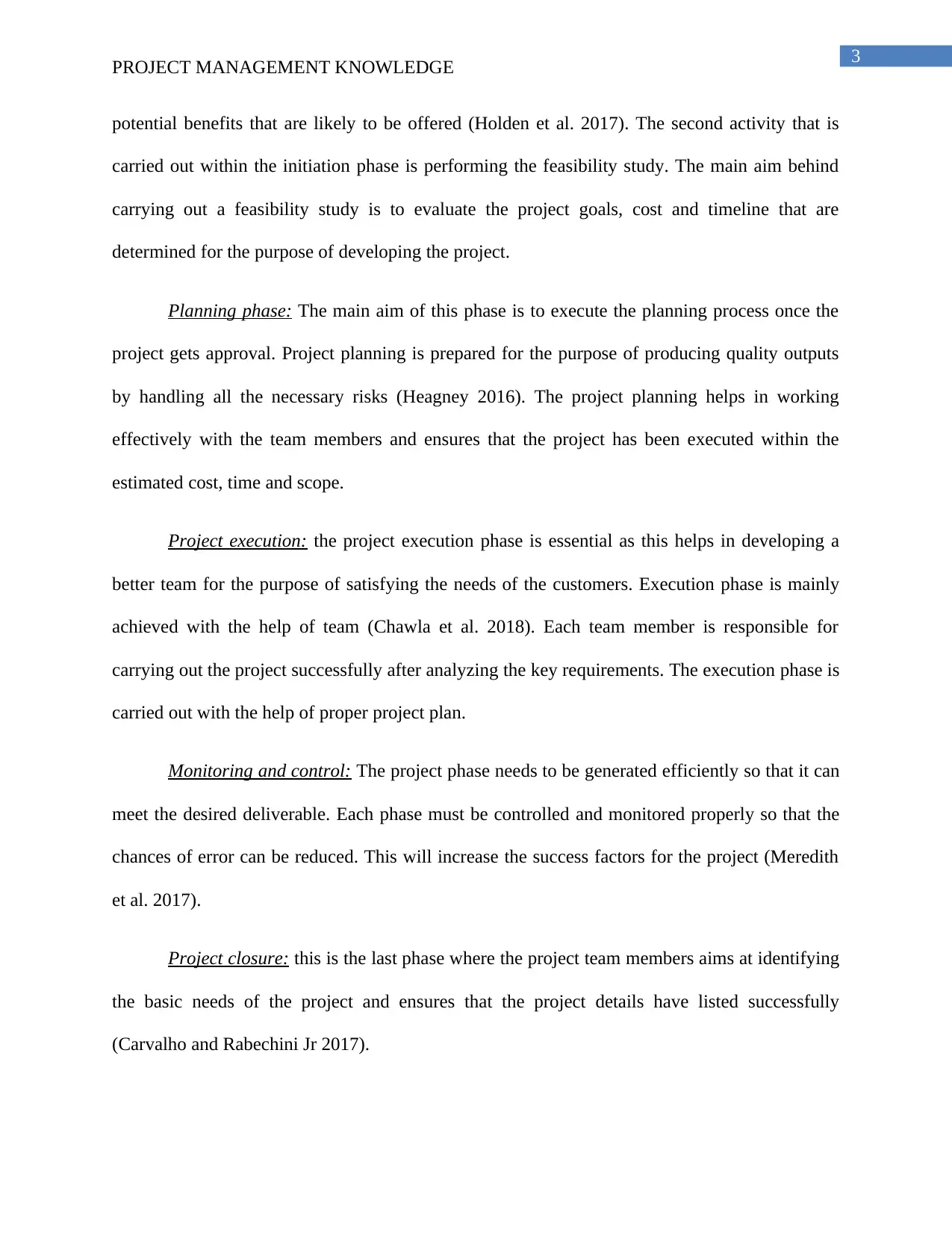
3
PROJECT MANAGEMENT KNOWLEDGE
potential benefits that are likely to be offered (Holden et al. 2017). The second activity that is
carried out within the initiation phase is performing the feasibility study. The main aim behind
carrying out a feasibility study is to evaluate the project goals, cost and timeline that are
determined for the purpose of developing the project.
Planning phase: The main aim of this phase is to execute the planning process once the
project gets approval. Project planning is prepared for the purpose of producing quality outputs
by handling all the necessary risks (Heagney 2016). The project planning helps in working
effectively with the team members and ensures that the project has been executed within the
estimated cost, time and scope.
Project execution: the project execution phase is essential as this helps in developing a
better team for the purpose of satisfying the needs of the customers. Execution phase is mainly
achieved with the help of team (Chawla et al. 2018). Each team member is responsible for
carrying out the project successfully after analyzing the key requirements. The execution phase is
carried out with the help of proper project plan.
Monitoring and control: The project phase needs to be generated efficiently so that it can
meet the desired deliverable. Each phase must be controlled and monitored properly so that the
chances of error can be reduced. This will increase the success factors for the project (Meredith
et al. 2017).
Project closure: this is the last phase where the project team members aims at identifying
the basic needs of the project and ensures that the project details have listed successfully
(Carvalho and Rabechini Jr 2017).
PROJECT MANAGEMENT KNOWLEDGE
potential benefits that are likely to be offered (Holden et al. 2017). The second activity that is
carried out within the initiation phase is performing the feasibility study. The main aim behind
carrying out a feasibility study is to evaluate the project goals, cost and timeline that are
determined for the purpose of developing the project.
Planning phase: The main aim of this phase is to execute the planning process once the
project gets approval. Project planning is prepared for the purpose of producing quality outputs
by handling all the necessary risks (Heagney 2016). The project planning helps in working
effectively with the team members and ensures that the project has been executed within the
estimated cost, time and scope.
Project execution: the project execution phase is essential as this helps in developing a
better team for the purpose of satisfying the needs of the customers. Execution phase is mainly
achieved with the help of team (Chawla et al. 2018). Each team member is responsible for
carrying out the project successfully after analyzing the key requirements. The execution phase is
carried out with the help of proper project plan.
Monitoring and control: The project phase needs to be generated efficiently so that it can
meet the desired deliverable. Each phase must be controlled and monitored properly so that the
chances of error can be reduced. This will increase the success factors for the project (Meredith
et al. 2017).
Project closure: this is the last phase where the project team members aims at identifying
the basic needs of the project and ensures that the project details have listed successfully
(Carvalho and Rabechini Jr 2017).
Paraphrase This Document
Need a fresh take? Get an instant paraphrase of this document with our AI Paraphraser
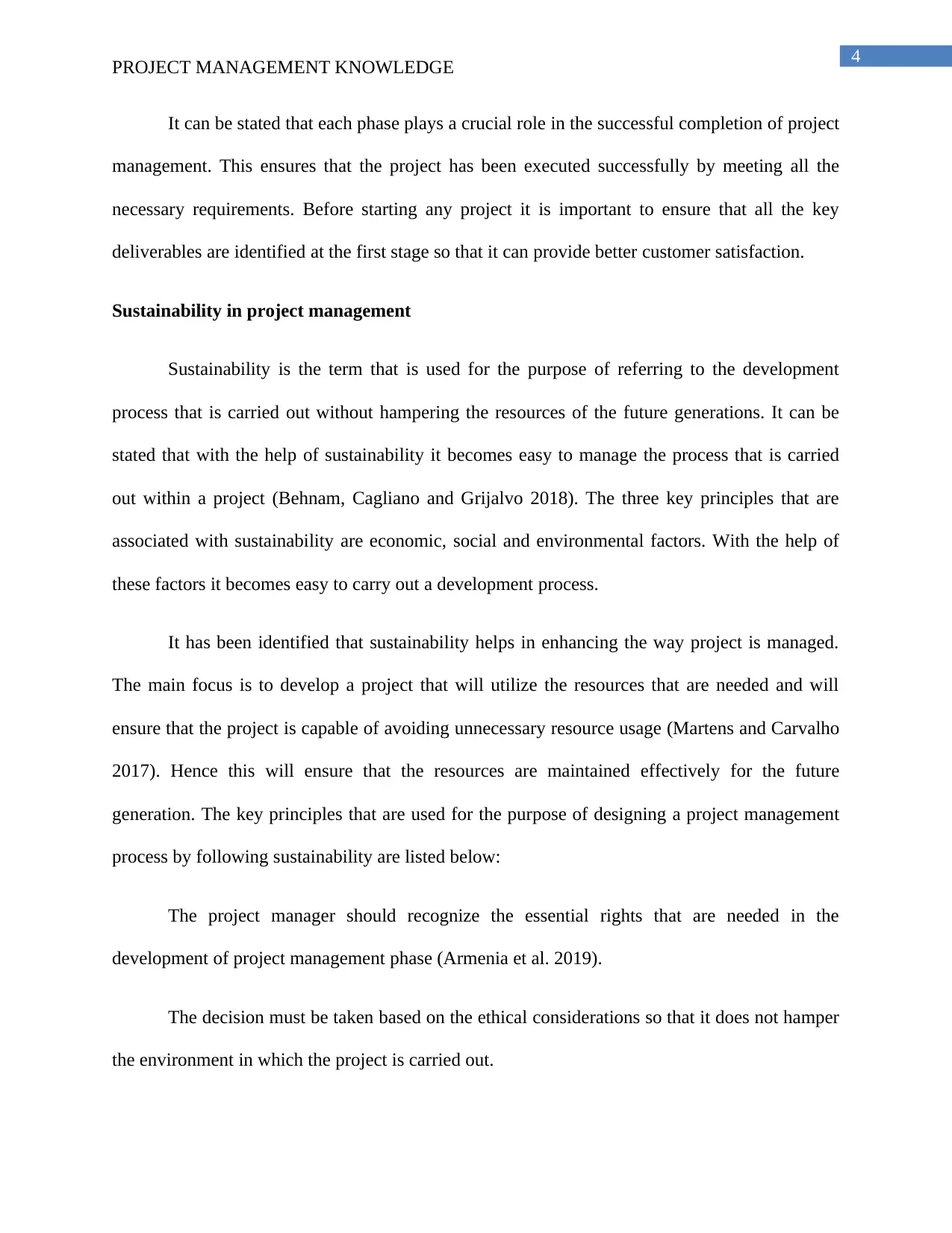
4
PROJECT MANAGEMENT KNOWLEDGE
It can be stated that each phase plays a crucial role in the successful completion of project
management. This ensures that the project has been executed successfully by meeting all the
necessary requirements. Before starting any project it is important to ensure that all the key
deliverables are identified at the first stage so that it can provide better customer satisfaction.
Sustainability in project management
Sustainability is the term that is used for the purpose of referring to the development
process that is carried out without hampering the resources of the future generations. It can be
stated that with the help of sustainability it becomes easy to manage the process that is carried
out within a project (Behnam, Cagliano and Grijalvo 2018). The three key principles that are
associated with sustainability are economic, social and environmental factors. With the help of
these factors it becomes easy to carry out a development process.
It has been identified that sustainability helps in enhancing the way project is managed.
The main focus is to develop a project that will utilize the resources that are needed and will
ensure that the project is capable of avoiding unnecessary resource usage (Martens and Carvalho
2017). Hence this will ensure that the resources are maintained effectively for the future
generation. The key principles that are used for the purpose of designing a project management
process by following sustainability are listed below:
The project manager should recognize the essential rights that are needed in the
development of project management phase (Armenia et al. 2019).
The decision must be taken based on the ethical considerations so that it does not hamper
the environment in which the project is carried out.
PROJECT MANAGEMENT KNOWLEDGE
It can be stated that each phase plays a crucial role in the successful completion of project
management. This ensures that the project has been executed successfully by meeting all the
necessary requirements. Before starting any project it is important to ensure that all the key
deliverables are identified at the first stage so that it can provide better customer satisfaction.
Sustainability in project management
Sustainability is the term that is used for the purpose of referring to the development
process that is carried out without hampering the resources of the future generations. It can be
stated that with the help of sustainability it becomes easy to manage the process that is carried
out within a project (Behnam, Cagliano and Grijalvo 2018). The three key principles that are
associated with sustainability are economic, social and environmental factors. With the help of
these factors it becomes easy to carry out a development process.
It has been identified that sustainability helps in enhancing the way project is managed.
The main focus is to develop a project that will utilize the resources that are needed and will
ensure that the project is capable of avoiding unnecessary resource usage (Martens and Carvalho
2017). Hence this will ensure that the resources are maintained effectively for the future
generation. The key principles that are used for the purpose of designing a project management
process by following sustainability are listed below:
The project manager should recognize the essential rights that are needed in the
development of project management phase (Armenia et al. 2019).
The decision must be taken based on the ethical considerations so that it does not hamper
the environment in which the project is carried out.
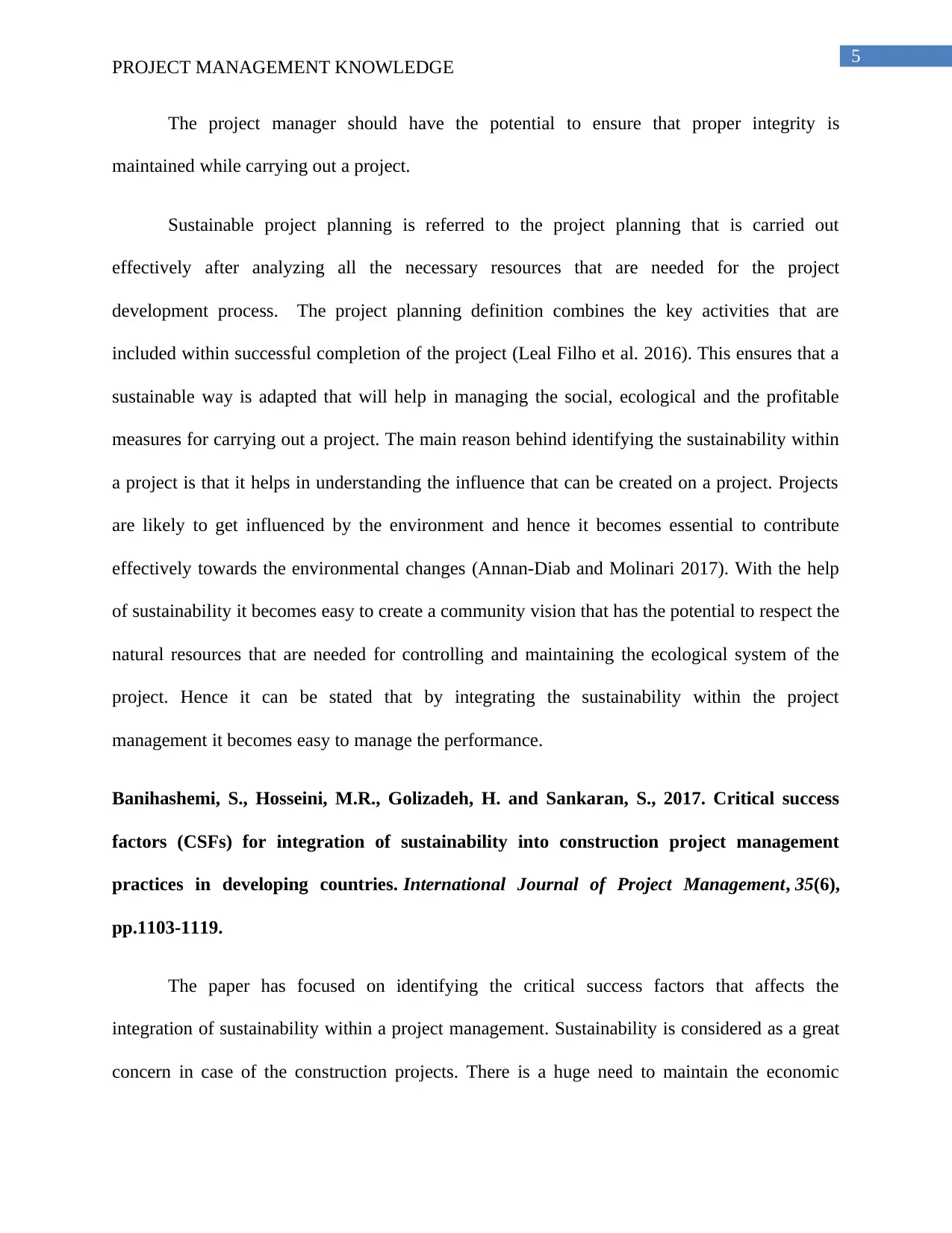
5
PROJECT MANAGEMENT KNOWLEDGE
The project manager should have the potential to ensure that proper integrity is
maintained while carrying out a project.
Sustainable project planning is referred to the project planning that is carried out
effectively after analyzing all the necessary resources that are needed for the project
development process. The project planning definition combines the key activities that are
included within successful completion of the project (Leal Filho et al. 2016). This ensures that a
sustainable way is adapted that will help in managing the social, ecological and the profitable
measures for carrying out a project. The main reason behind identifying the sustainability within
a project is that it helps in understanding the influence that can be created on a project. Projects
are likely to get influenced by the environment and hence it becomes essential to contribute
effectively towards the environmental changes (Annan-Diab and Molinari 2017). With the help
of sustainability it becomes easy to create a community vision that has the potential to respect the
natural resources that are needed for controlling and maintaining the ecological system of the
project. Hence it can be stated that by integrating the sustainability within the project
management it becomes easy to manage the performance.
Banihashemi, S., Hosseini, M.R., Golizadeh, H. and Sankaran, S., 2017. Critical success
factors (CSFs) for integration of sustainability into construction project management
practices in developing countries. International Journal of Project Management, 35(6),
pp.1103-1119.
The paper has focused on identifying the critical success factors that affects the
integration of sustainability within a project management. Sustainability is considered as a great
concern in case of the construction projects. There is a huge need to maintain the economic
PROJECT MANAGEMENT KNOWLEDGE
The project manager should have the potential to ensure that proper integrity is
maintained while carrying out a project.
Sustainable project planning is referred to the project planning that is carried out
effectively after analyzing all the necessary resources that are needed for the project
development process. The project planning definition combines the key activities that are
included within successful completion of the project (Leal Filho et al. 2016). This ensures that a
sustainable way is adapted that will help in managing the social, ecological and the profitable
measures for carrying out a project. The main reason behind identifying the sustainability within
a project is that it helps in understanding the influence that can be created on a project. Projects
are likely to get influenced by the environment and hence it becomes essential to contribute
effectively towards the environmental changes (Annan-Diab and Molinari 2017). With the help
of sustainability it becomes easy to create a community vision that has the potential to respect the
natural resources that are needed for controlling and maintaining the ecological system of the
project. Hence it can be stated that by integrating the sustainability within the project
management it becomes easy to manage the performance.
Banihashemi, S., Hosseini, M.R., Golizadeh, H. and Sankaran, S., 2017. Critical success
factors (CSFs) for integration of sustainability into construction project management
practices in developing countries. International Journal of Project Management, 35(6),
pp.1103-1119.
The paper has focused on identifying the critical success factors that affects the
integration of sustainability within a project management. Sustainability is considered as a great
concern in case of the construction projects. There is a huge need to maintain the economic
⊘ This is a preview!⊘
Do you want full access?
Subscribe today to unlock all pages.

Trusted by 1+ million students worldwide
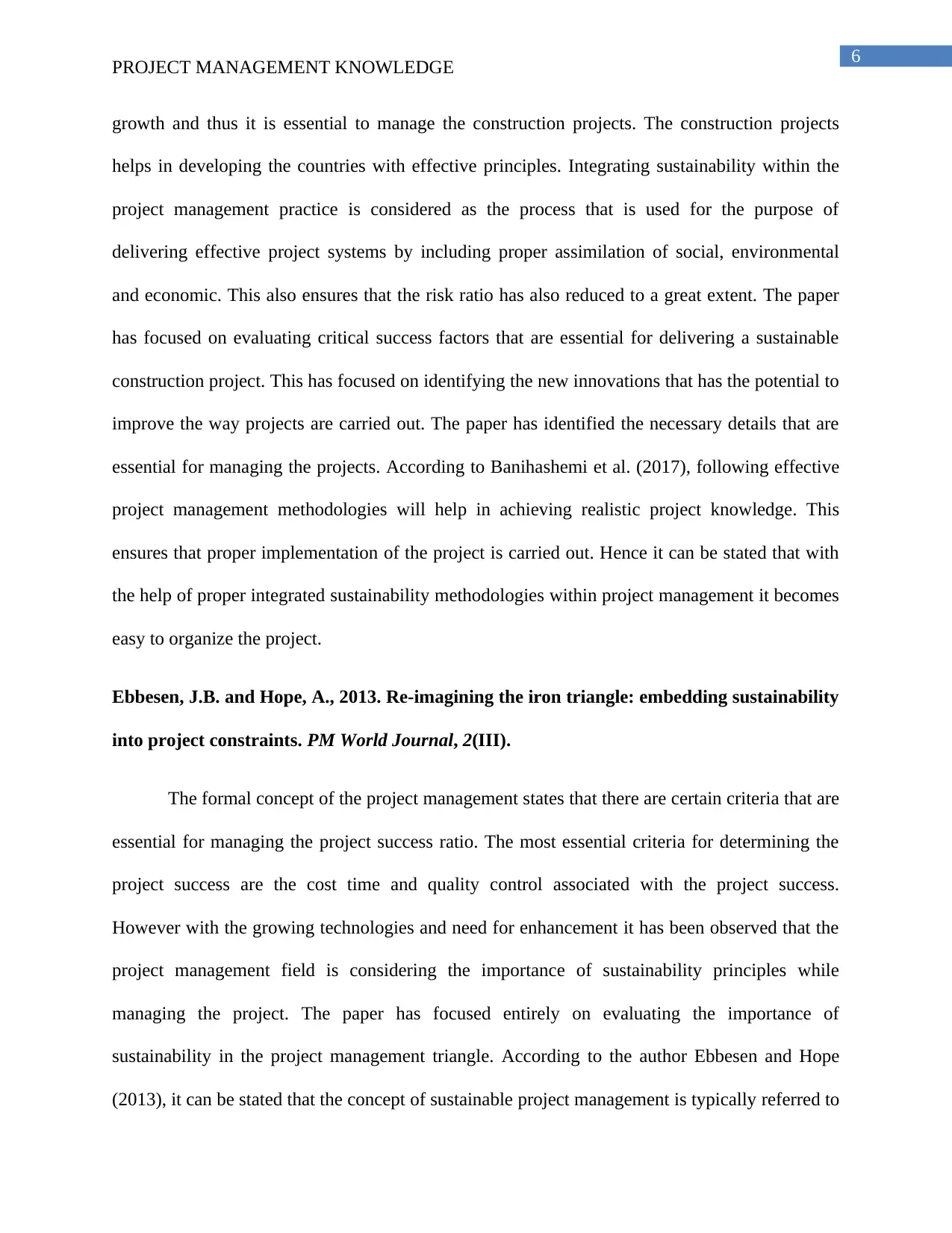
6
PROJECT MANAGEMENT KNOWLEDGE
growth and thus it is essential to manage the construction projects. The construction projects
helps in developing the countries with effective principles. Integrating sustainability within the
project management practice is considered as the process that is used for the purpose of
delivering effective project systems by including proper assimilation of social, environmental
and economic. This also ensures that the risk ratio has also reduced to a great extent. The paper
has focused on evaluating critical success factors that are essential for delivering a sustainable
construction project. This has focused on identifying the new innovations that has the potential to
improve the way projects are carried out. The paper has identified the necessary details that are
essential for managing the projects. According to Banihashemi et al. (2017), following effective
project management methodologies will help in achieving realistic project knowledge. This
ensures that proper implementation of the project is carried out. Hence it can be stated that with
the help of proper integrated sustainability methodologies within project management it becomes
easy to organize the project.
Ebbesen, J.B. and Hope, A., 2013. Re-imagining the iron triangle: embedding sustainability
into project constraints. PM World Journal, 2(III).
The formal concept of the project management states that there are certain criteria that are
essential for managing the project success ratio. The most essential criteria for determining the
project success are the cost time and quality control associated with the project success.
However with the growing technologies and need for enhancement it has been observed that the
project management field is considering the importance of sustainability principles while
managing the project. The paper has focused entirely on evaluating the importance of
sustainability in the project management triangle. According to the author Ebbesen and Hope
(2013), it can be stated that the concept of sustainable project management is typically referred to
PROJECT MANAGEMENT KNOWLEDGE
growth and thus it is essential to manage the construction projects. The construction projects
helps in developing the countries with effective principles. Integrating sustainability within the
project management practice is considered as the process that is used for the purpose of
delivering effective project systems by including proper assimilation of social, environmental
and economic. This also ensures that the risk ratio has also reduced to a great extent. The paper
has focused on evaluating critical success factors that are essential for delivering a sustainable
construction project. This has focused on identifying the new innovations that has the potential to
improve the way projects are carried out. The paper has identified the necessary details that are
essential for managing the projects. According to Banihashemi et al. (2017), following effective
project management methodologies will help in achieving realistic project knowledge. This
ensures that proper implementation of the project is carried out. Hence it can be stated that with
the help of proper integrated sustainability methodologies within project management it becomes
easy to organize the project.
Ebbesen, J.B. and Hope, A., 2013. Re-imagining the iron triangle: embedding sustainability
into project constraints. PM World Journal, 2(III).
The formal concept of the project management states that there are certain criteria that are
essential for managing the project success ratio. The most essential criteria for determining the
project success are the cost time and quality control associated with the project success.
However with the growing technologies and need for enhancement it has been observed that the
project management field is considering the importance of sustainability principles while
managing the project. The paper has focused entirely on evaluating the importance of
sustainability in the project management triangle. According to the author Ebbesen and Hope
(2013), it can be stated that the concept of sustainable project management is typically referred to
Paraphrase This Document
Need a fresh take? Get an instant paraphrase of this document with our AI Paraphraser
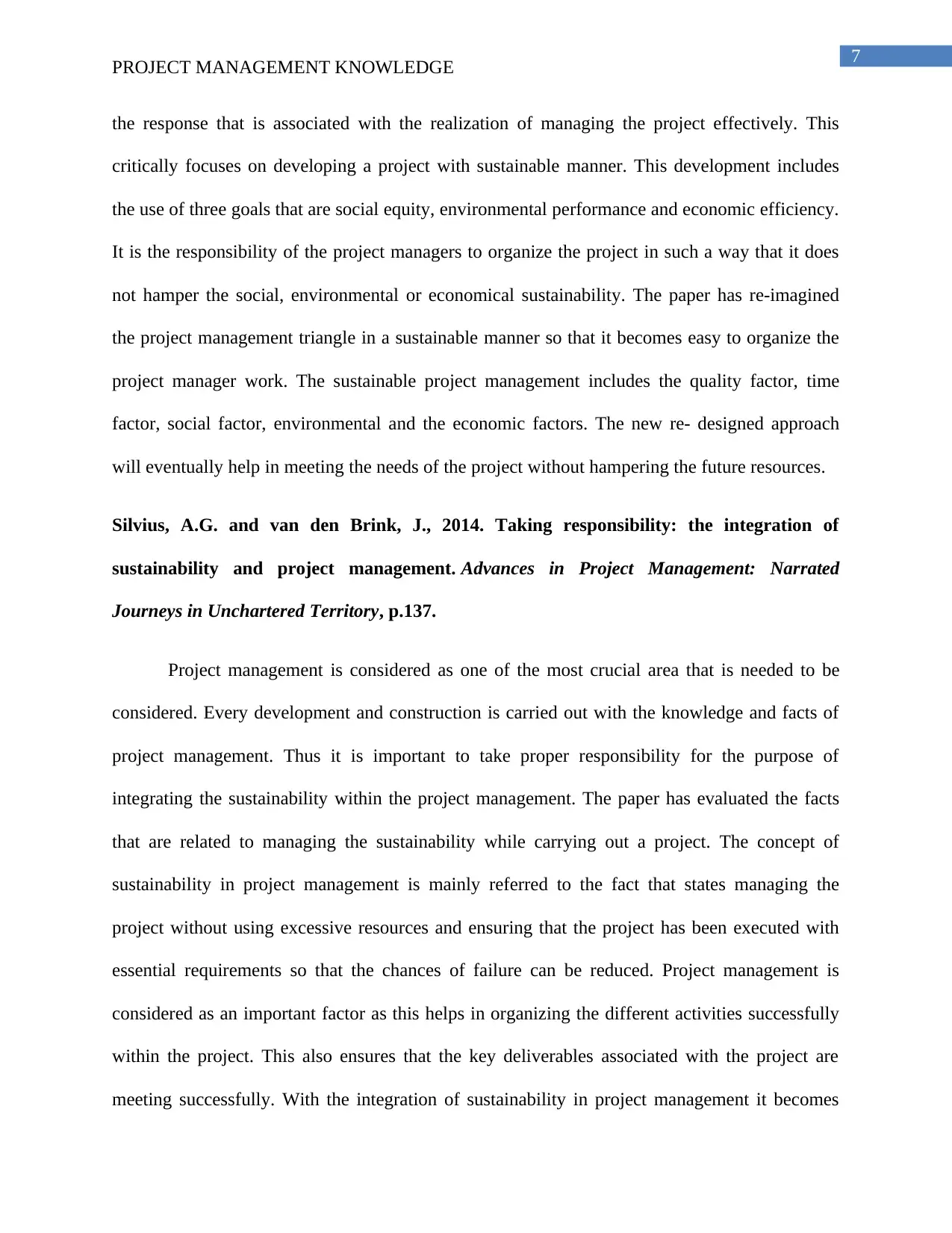
7
PROJECT MANAGEMENT KNOWLEDGE
the response that is associated with the realization of managing the project effectively. This
critically focuses on developing a project with sustainable manner. This development includes
the use of three goals that are social equity, environmental performance and economic efficiency.
It is the responsibility of the project managers to organize the project in such a way that it does
not hamper the social, environmental or economical sustainability. The paper has re-imagined
the project management triangle in a sustainable manner so that it becomes easy to organize the
project manager work. The sustainable project management includes the quality factor, time
factor, social factor, environmental and the economic factors. The new re- designed approach
will eventually help in meeting the needs of the project without hampering the future resources.
Silvius, A.G. and van den Brink, J., 2014. Taking responsibility: the integration of
sustainability and project management. Advances in Project Management: Narrated
Journeys in Unchartered Territory, p.137.
Project management is considered as one of the most crucial area that is needed to be
considered. Every development and construction is carried out with the knowledge and facts of
project management. Thus it is important to take proper responsibility for the purpose of
integrating the sustainability within the project management. The paper has evaluated the facts
that are related to managing the sustainability while carrying out a project. The concept of
sustainability in project management is mainly referred to the fact that states managing the
project without using excessive resources and ensuring that the project has been executed with
essential requirements so that the chances of failure can be reduced. Project management is
considered as an important factor as this helps in organizing the different activities successfully
within the project. This also ensures that the key deliverables associated with the project are
meeting successfully. With the integration of sustainability in project management it becomes
PROJECT MANAGEMENT KNOWLEDGE
the response that is associated with the realization of managing the project effectively. This
critically focuses on developing a project with sustainable manner. This development includes
the use of three goals that are social equity, environmental performance and economic efficiency.
It is the responsibility of the project managers to organize the project in such a way that it does
not hamper the social, environmental or economical sustainability. The paper has re-imagined
the project management triangle in a sustainable manner so that it becomes easy to organize the
project manager work. The sustainable project management includes the quality factor, time
factor, social factor, environmental and the economic factors. The new re- designed approach
will eventually help in meeting the needs of the project without hampering the future resources.
Silvius, A.G. and van den Brink, J., 2014. Taking responsibility: the integration of
sustainability and project management. Advances in Project Management: Narrated
Journeys in Unchartered Territory, p.137.
Project management is considered as one of the most crucial area that is needed to be
considered. Every development and construction is carried out with the knowledge and facts of
project management. Thus it is important to take proper responsibility for the purpose of
integrating the sustainability within the project management. The paper has evaluated the facts
that are related to managing the sustainability while carrying out a project. The concept of
sustainability in project management is mainly referred to the fact that states managing the
project without using excessive resources and ensuring that the project has been executed with
essential requirements so that the chances of failure can be reduced. Project management is
considered as an important factor as this helps in organizing the different activities successfully
within the project. This also ensures that the key deliverables associated with the project are
meeting successfully. With the integration of sustainability in project management it becomes
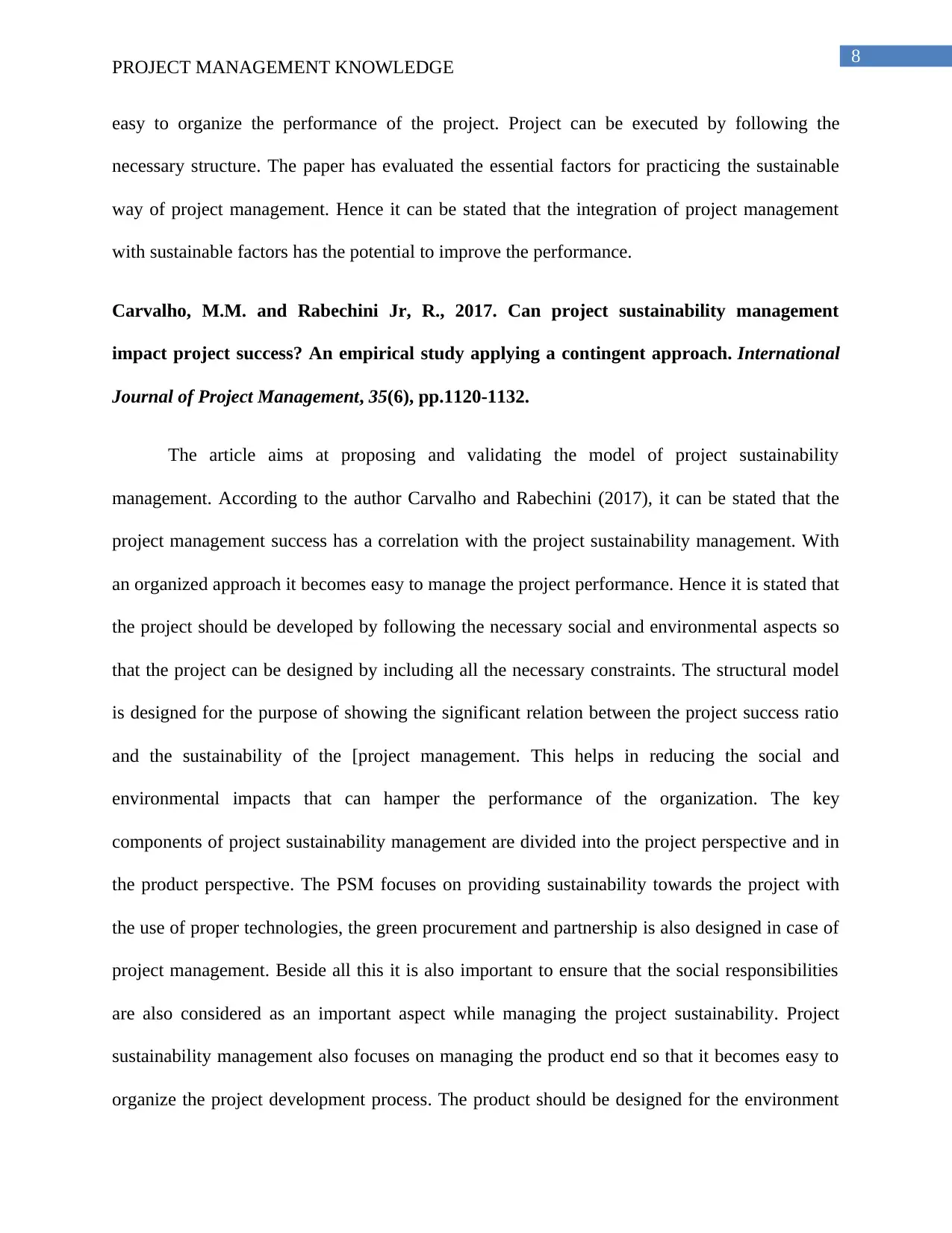
8
PROJECT MANAGEMENT KNOWLEDGE
easy to organize the performance of the project. Project can be executed by following the
necessary structure. The paper has evaluated the essential factors for practicing the sustainable
way of project management. Hence it can be stated that the integration of project management
with sustainable factors has the potential to improve the performance.
Carvalho, M.M. and Rabechini Jr, R., 2017. Can project sustainability management
impact project success? An empirical study applying a contingent approach. International
Journal of Project Management, 35(6), pp.1120-1132.
The article aims at proposing and validating the model of project sustainability
management. According to the author Carvalho and Rabechini (2017), it can be stated that the
project management success has a correlation with the project sustainability management. With
an organized approach it becomes easy to manage the project performance. Hence it is stated that
the project should be developed by following the necessary social and environmental aspects so
that the project can be designed by including all the necessary constraints. The structural model
is designed for the purpose of showing the significant relation between the project success ratio
and the sustainability of the [project management. This helps in reducing the social and
environmental impacts that can hamper the performance of the organization. The key
components of project sustainability management are divided into the project perspective and in
the product perspective. The PSM focuses on providing sustainability towards the project with
the use of proper technologies, the green procurement and partnership is also designed in case of
project management. Beside all this it is also important to ensure that the social responsibilities
are also considered as an important aspect while managing the project sustainability. Project
sustainability management also focuses on managing the product end so that it becomes easy to
organize the project development process. The product should be designed for the environment
PROJECT MANAGEMENT KNOWLEDGE
easy to organize the performance of the project. Project can be executed by following the
necessary structure. The paper has evaluated the essential factors for practicing the sustainable
way of project management. Hence it can be stated that the integration of project management
with sustainable factors has the potential to improve the performance.
Carvalho, M.M. and Rabechini Jr, R., 2017. Can project sustainability management
impact project success? An empirical study applying a contingent approach. International
Journal of Project Management, 35(6), pp.1120-1132.
The article aims at proposing and validating the model of project sustainability
management. According to the author Carvalho and Rabechini (2017), it can be stated that the
project management success has a correlation with the project sustainability management. With
an organized approach it becomes easy to manage the project performance. Hence it is stated that
the project should be developed by following the necessary social and environmental aspects so
that the project can be designed by including all the necessary constraints. The structural model
is designed for the purpose of showing the significant relation between the project success ratio
and the sustainability of the [project management. This helps in reducing the social and
environmental impacts that can hamper the performance of the organization. The key
components of project sustainability management are divided into the project perspective and in
the product perspective. The PSM focuses on providing sustainability towards the project with
the use of proper technologies, the green procurement and partnership is also designed in case of
project management. Beside all this it is also important to ensure that the social responsibilities
are also considered as an important aspect while managing the project sustainability. Project
sustainability management also focuses on managing the product end so that it becomes easy to
organize the project development process. The product should be designed for the environment
⊘ This is a preview!⊘
Do you want full access?
Subscribe today to unlock all pages.

Trusted by 1+ million students worldwide
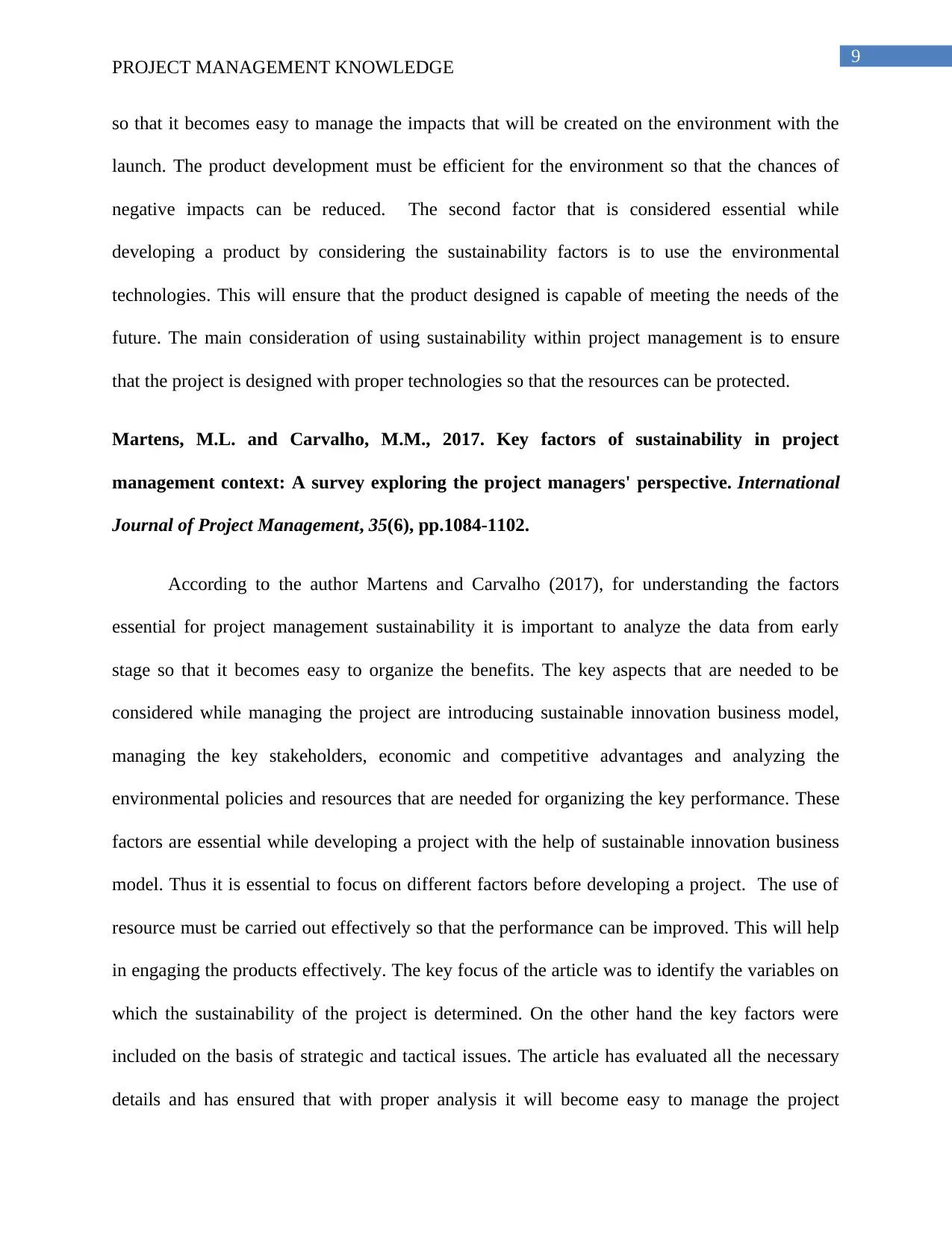
9
PROJECT MANAGEMENT KNOWLEDGE
so that it becomes easy to manage the impacts that will be created on the environment with the
launch. The product development must be efficient for the environment so that the chances of
negative impacts can be reduced. The second factor that is considered essential while
developing a product by considering the sustainability factors is to use the environmental
technologies. This will ensure that the product designed is capable of meeting the needs of the
future. The main consideration of using sustainability within project management is to ensure
that the project is designed with proper technologies so that the resources can be protected.
Martens, M.L. and Carvalho, M.M., 2017. Key factors of sustainability in project
management context: A survey exploring the project managers' perspective. International
Journal of Project Management, 35(6), pp.1084-1102.
According to the author Martens and Carvalho (2017), for understanding the factors
essential for project management sustainability it is important to analyze the data from early
stage so that it becomes easy to organize the benefits. The key aspects that are needed to be
considered while managing the project are introducing sustainable innovation business model,
managing the key stakeholders, economic and competitive advantages and analyzing the
environmental policies and resources that are needed for organizing the key performance. These
factors are essential while developing a project with the help of sustainable innovation business
model. Thus it is essential to focus on different factors before developing a project. The use of
resource must be carried out effectively so that the performance can be improved. This will help
in engaging the products effectively. The key focus of the article was to identify the variables on
which the sustainability of the project is determined. On the other hand the key factors were
included on the basis of strategic and tactical issues. The article has evaluated all the necessary
details and has ensured that with proper analysis it will become easy to manage the project
PROJECT MANAGEMENT KNOWLEDGE
so that it becomes easy to manage the impacts that will be created on the environment with the
launch. The product development must be efficient for the environment so that the chances of
negative impacts can be reduced. The second factor that is considered essential while
developing a product by considering the sustainability factors is to use the environmental
technologies. This will ensure that the product designed is capable of meeting the needs of the
future. The main consideration of using sustainability within project management is to ensure
that the project is designed with proper technologies so that the resources can be protected.
Martens, M.L. and Carvalho, M.M., 2017. Key factors of sustainability in project
management context: A survey exploring the project managers' perspective. International
Journal of Project Management, 35(6), pp.1084-1102.
According to the author Martens and Carvalho (2017), for understanding the factors
essential for project management sustainability it is important to analyze the data from early
stage so that it becomes easy to organize the benefits. The key aspects that are needed to be
considered while managing the project are introducing sustainable innovation business model,
managing the key stakeholders, economic and competitive advantages and analyzing the
environmental policies and resources that are needed for organizing the key performance. These
factors are essential while developing a project with the help of sustainable innovation business
model. Thus it is essential to focus on different factors before developing a project. The use of
resource must be carried out effectively so that the performance can be improved. This will help
in engaging the products effectively. The key focus of the article was to identify the variables on
which the sustainability of the project is determined. On the other hand the key factors were
included on the basis of strategic and tactical issues. The article has evaluated all the necessary
details and has ensured that with proper analysis it will become easy to manage the project
Paraphrase This Document
Need a fresh take? Get an instant paraphrase of this document with our AI Paraphraser
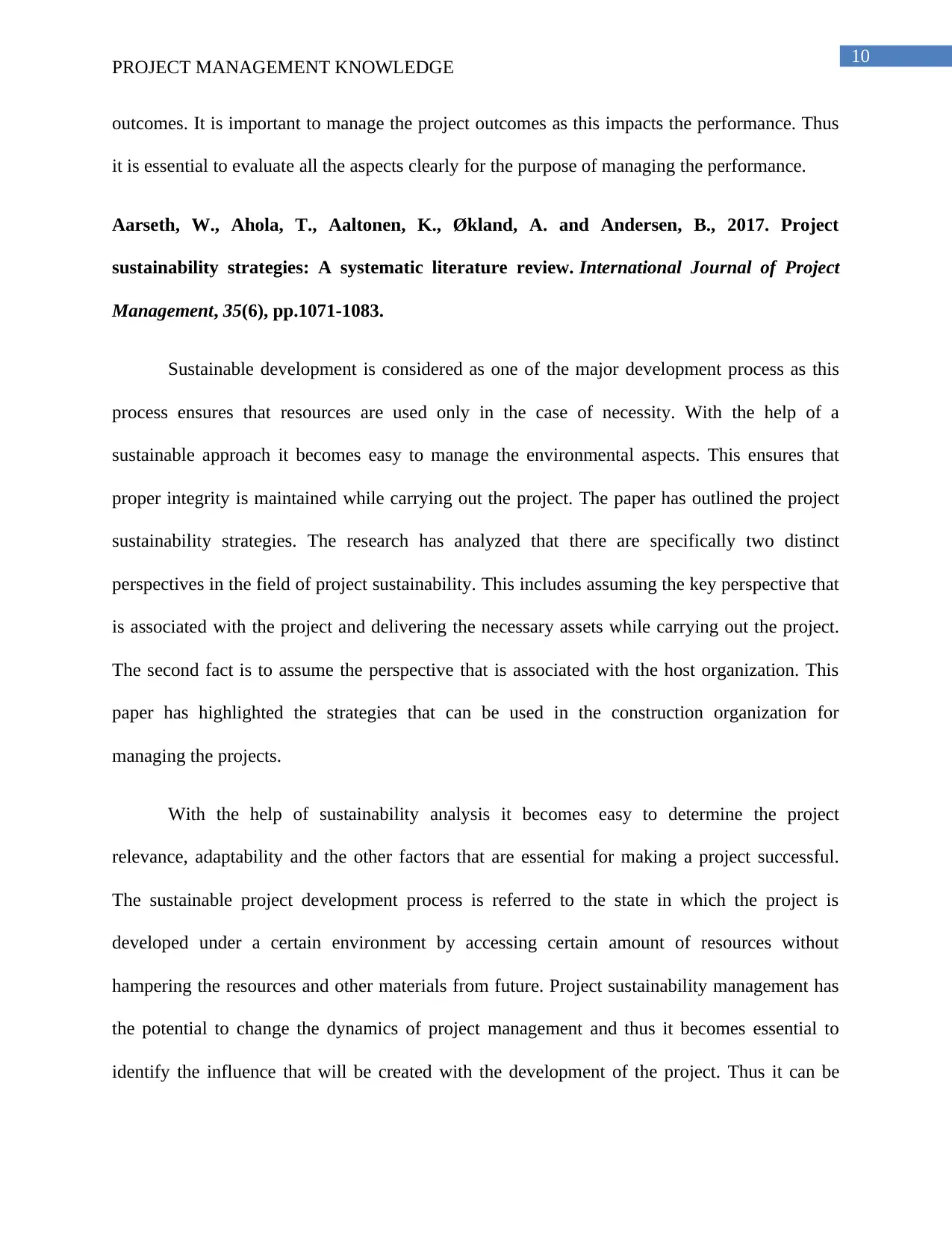
10
PROJECT MANAGEMENT KNOWLEDGE
outcomes. It is important to manage the project outcomes as this impacts the performance. Thus
it is essential to evaluate all the aspects clearly for the purpose of managing the performance.
Aarseth, W., Ahola, T., Aaltonen, K., Økland, A. and Andersen, B., 2017. Project
sustainability strategies: A systematic literature review. International Journal of Project
Management, 35(6), pp.1071-1083.
Sustainable development is considered as one of the major development process as this
process ensures that resources are used only in the case of necessity. With the help of a
sustainable approach it becomes easy to manage the environmental aspects. This ensures that
proper integrity is maintained while carrying out the project. The paper has outlined the project
sustainability strategies. The research has analyzed that there are specifically two distinct
perspectives in the field of project sustainability. This includes assuming the key perspective that
is associated with the project and delivering the necessary assets while carrying out the project.
The second fact is to assume the perspective that is associated with the host organization. This
paper has highlighted the strategies that can be used in the construction organization for
managing the projects.
With the help of sustainability analysis it becomes easy to determine the project
relevance, adaptability and the other factors that are essential for making a project successful.
The sustainable project development process is referred to the state in which the project is
developed under a certain environment by accessing certain amount of resources without
hampering the resources and other materials from future. Project sustainability management has
the potential to change the dynamics of project management and thus it becomes essential to
identify the influence that will be created with the development of the project. Thus it can be
PROJECT MANAGEMENT KNOWLEDGE
outcomes. It is important to manage the project outcomes as this impacts the performance. Thus
it is essential to evaluate all the aspects clearly for the purpose of managing the performance.
Aarseth, W., Ahola, T., Aaltonen, K., Økland, A. and Andersen, B., 2017. Project
sustainability strategies: A systematic literature review. International Journal of Project
Management, 35(6), pp.1071-1083.
Sustainable development is considered as one of the major development process as this
process ensures that resources are used only in the case of necessity. With the help of a
sustainable approach it becomes easy to manage the environmental aspects. This ensures that
proper integrity is maintained while carrying out the project. The paper has outlined the project
sustainability strategies. The research has analyzed that there are specifically two distinct
perspectives in the field of project sustainability. This includes assuming the key perspective that
is associated with the project and delivering the necessary assets while carrying out the project.
The second fact is to assume the perspective that is associated with the host organization. This
paper has highlighted the strategies that can be used in the construction organization for
managing the projects.
With the help of sustainability analysis it becomes easy to determine the project
relevance, adaptability and the other factors that are essential for making a project successful.
The sustainable project development process is referred to the state in which the project is
developed under a certain environment by accessing certain amount of resources without
hampering the resources and other materials from future. Project sustainability management has
the potential to change the dynamics of project management and thus it becomes essential to
identify the influence that will be created with the development of the project. Thus it can be
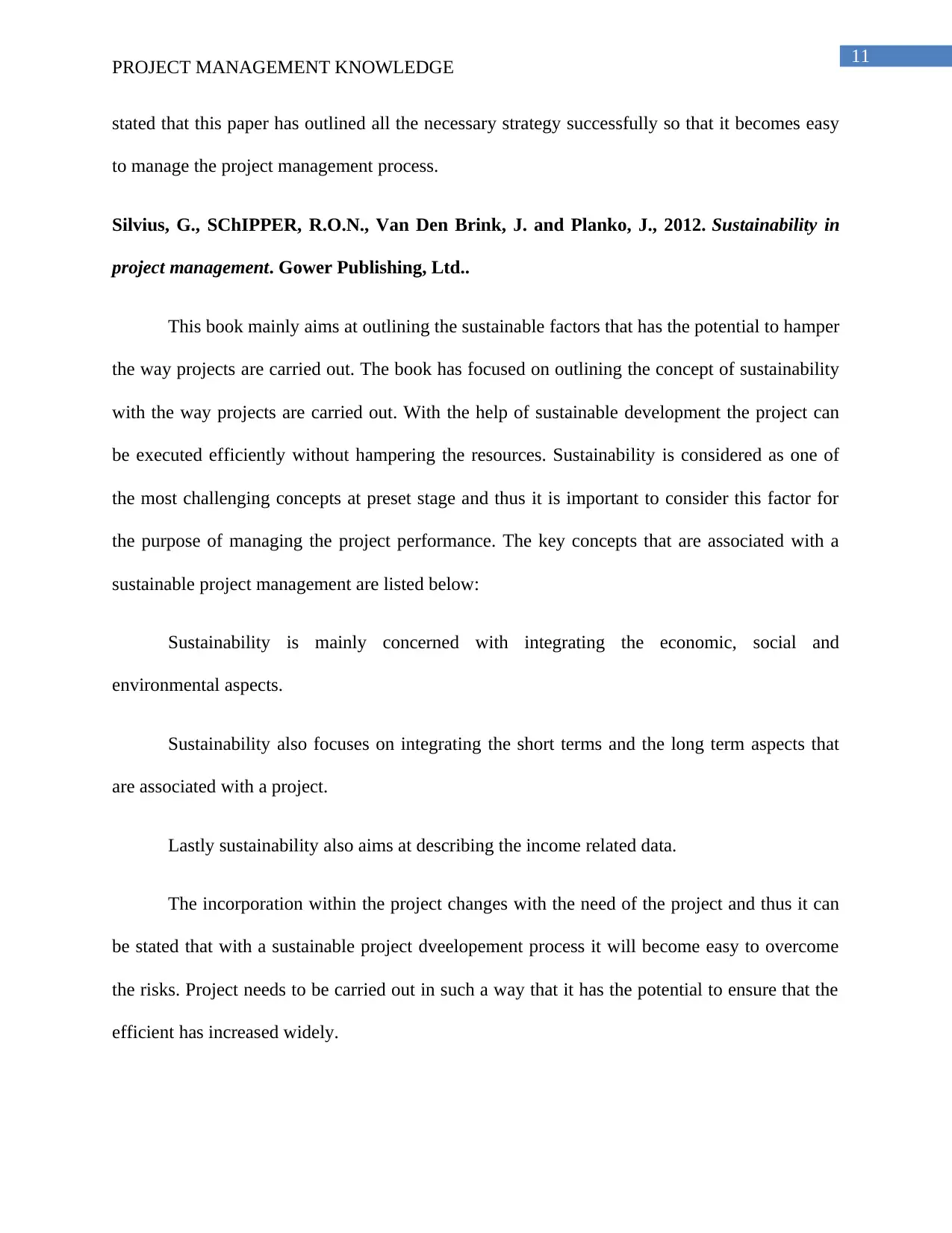
11
PROJECT MANAGEMENT KNOWLEDGE
stated that this paper has outlined all the necessary strategy successfully so that it becomes easy
to manage the project management process.
Silvius, G., SChIPPER, R.O.N., Van Den Brink, J. and Planko, J., 2012. Sustainability in
project management. Gower Publishing, Ltd..
This book mainly aims at outlining the sustainable factors that has the potential to hamper
the way projects are carried out. The book has focused on outlining the concept of sustainability
with the way projects are carried out. With the help of sustainable development the project can
be executed efficiently without hampering the resources. Sustainability is considered as one of
the most challenging concepts at preset stage and thus it is important to consider this factor for
the purpose of managing the project performance. The key concepts that are associated with a
sustainable project management are listed below:
Sustainability is mainly concerned with integrating the economic, social and
environmental aspects.
Sustainability also focuses on integrating the short terms and the long term aspects that
are associated with a project.
Lastly sustainability also aims at describing the income related data.
The incorporation within the project changes with the need of the project and thus it can
be stated that with a sustainable project dveelopement process it will become easy to overcome
the risks. Project needs to be carried out in such a way that it has the potential to ensure that the
efficient has increased widely.
PROJECT MANAGEMENT KNOWLEDGE
stated that this paper has outlined all the necessary strategy successfully so that it becomes easy
to manage the project management process.
Silvius, G., SChIPPER, R.O.N., Van Den Brink, J. and Planko, J., 2012. Sustainability in
project management. Gower Publishing, Ltd..
This book mainly aims at outlining the sustainable factors that has the potential to hamper
the way projects are carried out. The book has focused on outlining the concept of sustainability
with the way projects are carried out. With the help of sustainable development the project can
be executed efficiently without hampering the resources. Sustainability is considered as one of
the most challenging concepts at preset stage and thus it is important to consider this factor for
the purpose of managing the project performance. The key concepts that are associated with a
sustainable project management are listed below:
Sustainability is mainly concerned with integrating the economic, social and
environmental aspects.
Sustainability also focuses on integrating the short terms and the long term aspects that
are associated with a project.
Lastly sustainability also aims at describing the income related data.
The incorporation within the project changes with the need of the project and thus it can
be stated that with a sustainable project dveelopement process it will become easy to overcome
the risks. Project needs to be carried out in such a way that it has the potential to ensure that the
efficient has increased widely.
⊘ This is a preview!⊘
Do you want full access?
Subscribe today to unlock all pages.

Trusted by 1+ million students worldwide
1 out of 16
Related Documents
Your All-in-One AI-Powered Toolkit for Academic Success.
+13062052269
info@desklib.com
Available 24*7 on WhatsApp / Email
![[object Object]](/_next/static/media/star-bottom.7253800d.svg)
Unlock your academic potential
Copyright © 2020–2026 A2Z Services. All Rights Reserved. Developed and managed by ZUCOL.





